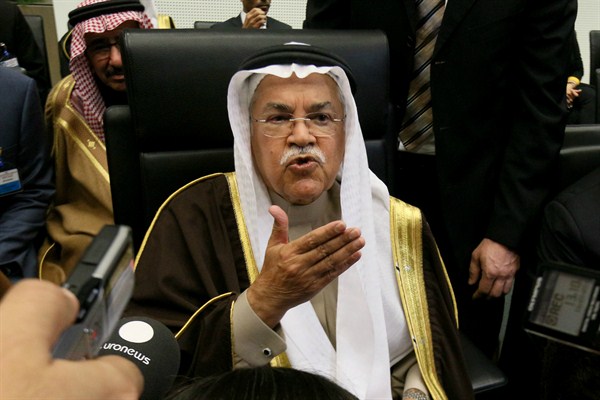“We’re all in this together,” said Ali al-Naimi, Saudi Arabia’s veteran oil minister, at an oil conference in Houston last week. The oil market “could drown in oversupply,” as the International Energy Agency (IEA) warned in January, and global prices are at their lowest level since 2003, so all petrostates are bleeding. Venezuela is on the brink of bankruptcy; Russia’s economy is expected to shrink for the second year in a row; and Nigeria and Azerbaijan are seeking emergency loans from the World Bank and the International Monetary Fund. The economic hardship experienced by its members makes one wonder why the Organization of the Petroleum Exporting Countries (OPEC) has not cut its production to prop up oil prices, as it has done regularly during the past three decades. The answer, in short, is that the oil market has changed dramatically. The self-proclaimed cartel will have a hard time carving out a new niche for itself in this new oil age.
The agreement reached among Saudi Arabia, Russia, Qatar and Venezuela on Feb. 16, in which they said they were willing to freeze production at January levels if other major producers would join the effort, is unlikely to turn the tide. Some observers have interpreted this agreement as a stepping-stone toward an eventual production cut, since previous coordinated production cuts between OPEC and non-OPEC countries were also initiated with such a freeze. But for now, it is highly unlikely that these countries will actually agree to jointly stem the world’s oversupply of oil.
Saudi Arabia is the key player in this drama. Due to its immense reserves, low production costs, and large export potential, Saudi Arabia occupies a pivotal position within OPEC. Without Riyadh’s cooperation, it would be futile for the other members to cut production. This gives the oil-rich kingdom the power to block any action at OPEC, as it has effectively done since an infamous meeting in November 2014, the first one since the oil price began to fall, when it nixed calls for production cuts from poorer members. At the time, al-Naimi called it “a great decision.”

